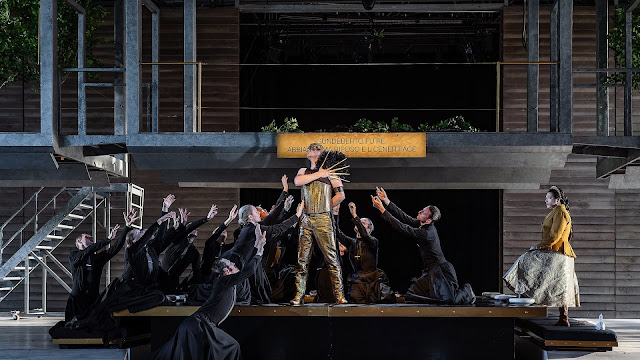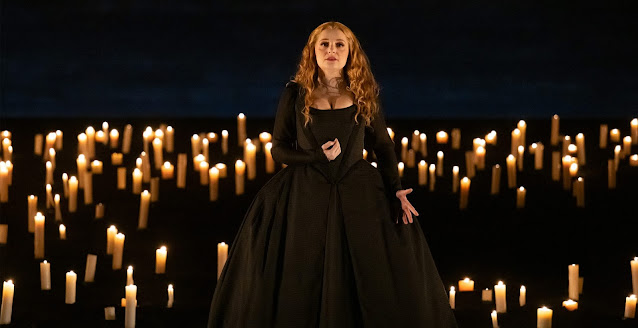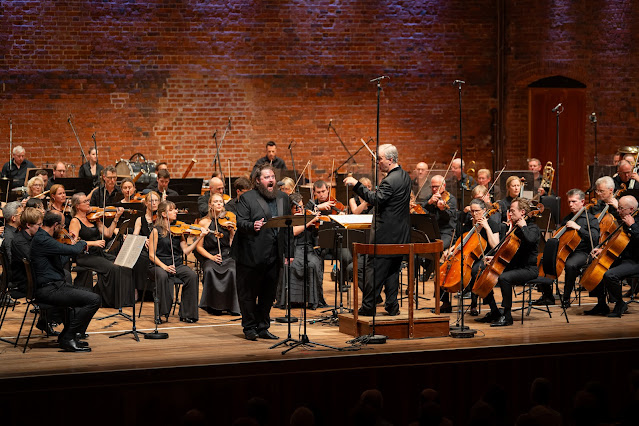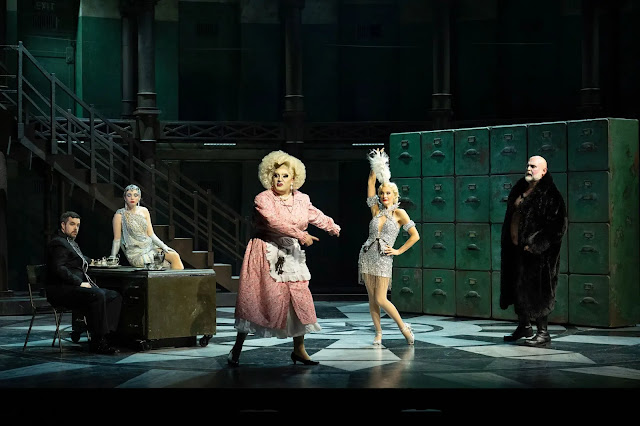 |
| Daniel Kidane: Aloud - Nathan Amaral, Royal College of Music Symphony Orchestra, Kirill Karabits - Aldeburgh Festival (Photo: Britten Pears Arts) |
Thea Musgrave: Rorate coeli, Britten: A.M.D.G., Palestrina: Rorate coeli, Daniel Kidane: The Song Thrush and the Mountain Ash, Schoenberg: Friede auf Erden, Poulenc: Figure humaine; BBC Singers, Owain Park; Snape Maltings
Britten: Winter Words, Imogen Holst: Weathers, Little think’st at thou, poore flower, Four Songs, Daniel Kidane: Songs of Illumination; Britten: Folksong arrangements; Nick Pritchard, Ian Tindale; Jubilee Hall
Britten: Four Sea Interludes from Peter Grimes, Daniel Kidane: Aloud, Reinhold Glière: The Zaporozhy Cossacks, Shostakovich: Symphony No.9; Nathan Amaral, Royal College of Music Symphony Orchestra, Kirill Karabits; Snape Maltings
Britten: Seven Sonnets of Michelangelo, Vaughan Williams: On Wenlock Edge, Elgar: Quintet in A minor for piano and string quartet; Allan Clayton, Antonio Pappano, London Symphony Orchestra principals: Benjamin Gilmore /Julián Gil Rodríguez (violins), Elvind Ringstad (viola), David Cohen (cello); Snape Maltings
Berlioz: Overture to Le corsaire; Boulez: Mémoriale, Debussy: Images’, Book II, orch. Colin Matthews, Berlioz: Symphonie fantastique; London Symphony Orchestra, Antonio Pappano; Snape Maltings
Reviewed by Tony Cooper: 26-29 June 2025
From the BBC Singers in Britten & Schoenberg, to the RCM Symphony Orchestra on top form, a brace of terrific tenors, plus Berlioz & Boulez from the LSO
A marvellous person! A marvellous composer! When BBC’s Tom Service asked the revered Scottish composer, Thea Musgrave (now in her 97th year) her view of being a woman composer, she replied: ‘Yes, I am a woman; I am a composer, too. But rarely at the same time.’ She admits that pursuing music can be a difficult career and her advice to young composers: ‘Don't do it, unless you need to. And if you do, enjoy every minute of it.’ [see Robert's 90th birthday interview with her].
I think it’s fair to say that Musgrave has enjoyed every minute of her chosen profession and most probably influenced other composers along the way: Judith Weir, for one, who acknowledges Musgrave as a significant influence on her own compositional style while Musgrave, in turn, acknowledges the influence of such luminous composers as Stravinsky, Schoenberg and Berg in her early development.
I always enjoy Musgrave’s work and it was in 1964 when I first encountered her music when the 1964 Norfolk & Norwich Triennial Festival commissioned The Five Ages of Man, a cantata she wrote for soprano, chorus and orchestra, premièred by the Norwich Philharmonic Orchestra and the Norwich Philharmonic Chorus in St Andrew’s Hall, Norwich, conducted by Charles Mackerras. The text comes from Hesiod’s Works and Ways, a Greek version of the story of the decline and fall of man.
However, getting up to date, in January last year I enjoyed a rare and captivating production by Oper Leipzig of Mary, Queen of Scots [see Tony's review], the first of four operas Musgrave wrote focusing on historical figures - the others being Harriet, the Woman Called Moses (1985), Simón Bolívar (1995) and Pontalba (2003).
%20Britten%20Pears%20Arts%20(1%20of%2014).jpg) |
| Thea Musgrave: Rorate Coeli - BBC Singers, Owain Park - Aldeburgh Festival (Photo: Britten Pears Arts) |
Now reunited with Musgrave at Aldeburgh, I thoroughly enjoyed Rorate coeli, the opening work in the BBC Singers’ concert at Snape Maltings Concert Hall, conducted by Owain Park - Thursday 26 June. I was truly soaking up the atmosphere, intensity and poignancy of the piece as much as I did with Mary, Queen of Scots. Musgrave ended with an exultant, jubilant and dramatic setting of the ‘Gloria’ while Palestrina’s setting of the same work, heard in the same programme, was equally as dramatic offering an extended ‘Alleluia’ to bring the work to a thoughtful and dignified close.

.jpg)
.jpg)



%20Anthony%20Robling.jpg)







%20Britten%20Pears%20Arts%20(17).jpg)
%20in%20Trial%20by%20Jury.%20Credit%20Mihaela%20Bodlovic..jpg)


%20Britten%20Pears%20Arts%20(1).jpg)
%20Britten%20Pears%20Arts%20(3).jpg)







%20in%20The%20Merry%20Widow.%20Credit%20Mihaela%20Bodlovic.%20(2).jpg)
%20in%20Scottish%20Opera_s%20production%20of%20The%20Merry%20Widow.%20Credit%20Mihaela%20Bodlovic.%20(2).jpg)


%20in%20The%20Merry%20Widow.%20Credit%20Mihaela%20Bodlovic.%20(2).jpg)

%20in%20Trial%20by%20Jury.%20Credit%20Mihaela%20Bodlovic..jpg)

.jpg)
%20Britten%20Pears%20Arts%20(1).jpg)


